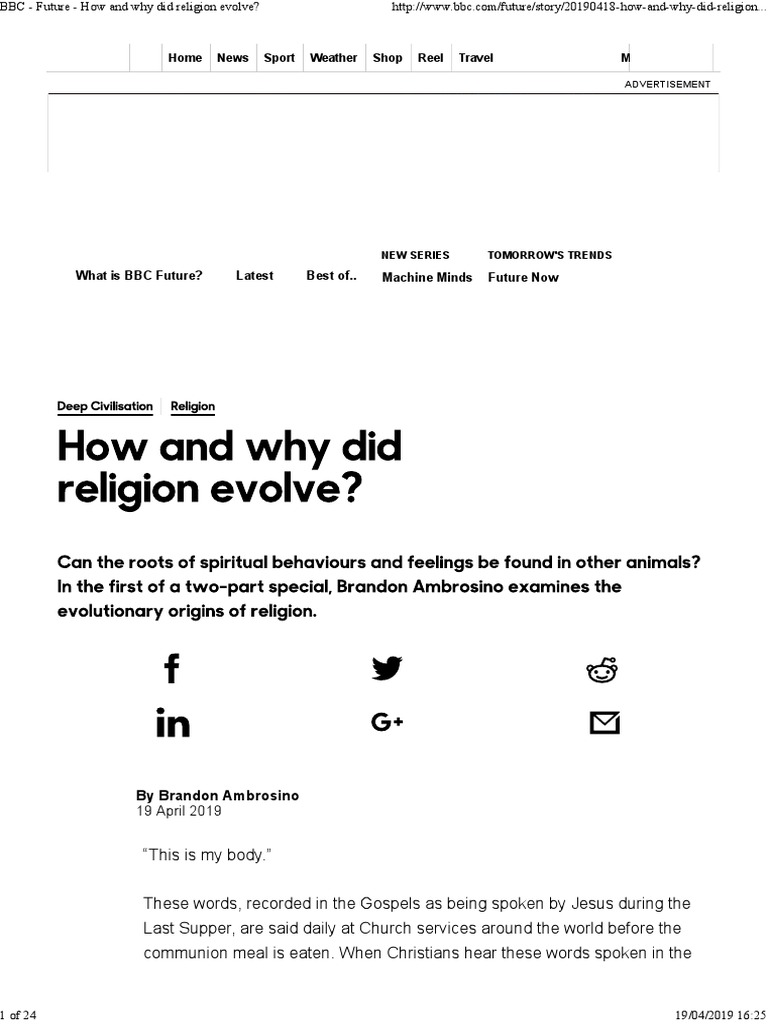In the vast tapestry of human history, religion has been a cornerstone, shaping cultures and societies across epochs and continents. Yet, as we traverse the ever-evolving landscape of modernity, a palpable tension emerges: how can these sacred traditions adapt without losing their essence? This intricate dance of progress and preservation is particularly manifested in the Bahá’í Faith, where the symbiosis of adaptability and continuity is paramount. This exploration seeks to elucidate the Bahá’í teachings on the evolution of religion as a response to modern challenges and opportunities.
At the heart of the Bahá’í philosophy lies the notion of progressive revelation. The idea suggests that religion is not a static relic but a living, dynamic force, revealing its truths incrementally, akin to the gradual unfolding of a flower. This metaphor captures the essence of adaptability in the face of modernity. Just as a flower blooms in response to the changing seasons, so too must religious teachings cultivate relevance to contemporary discourse.
To comprehend this evolution, it is critical to acknowledge the historical context of the Bahá’í Faith. Founded in the mid-19th century by Bahá’u’lláh in Persia, it arose amidst a backdrop of profound social upheaval, demanding social justice, equality, and unity among humanity. These principles resonate deeply with the challenges faced today: globalization, environmental crises, and cultural pluralism. The Bahá’í teachings urge a re-examination of traditional doctrines, advocating for a religion that embraces the pluralism of modern society as a testament to its vitality.
Central to the Bahá’í approach to modernity is the principle that spiritual truths must adapt to the insights of contemporary science and reason. This synthesis between faith and intellect is not merely an academic exercise; it represents a crucial paradigm shift. In a world increasingly driven by scientific inquiry and technological advancement, relegating religious beliefs to mere antiquities is neither tenable nor desirable. The Bahá’í perspective posits that genuine faith should harmonize with the findings of the natural world, allowing believers to engage intellectually while maintaining spiritual integrity.
Moreover, the Bahá’í teachings emphasize the importance of gender equality as an essential component of a modern religious framework. This principle is not limited to mere rhetoric; it permeates every facet of Bahá’í life, invigorating communities to embrace the full participation of women in spiritual and leadership roles. The transformative power of gender equity is akin to the synergistic effect of various instruments in an orchestra, resulting in a more profound, harmonious sound when diverse voices converge. This inclusivity emboldens the Bahá’í community to model a society where each individual, regardless of gender, contributes to the collective well-being.
Emphasizing the interconnectedness of humanity, the Bahá’í teachings advocate for global citizenship and collaborative efforts to address pressing human dilemmas. Religious evolution intertwines with the spirit of solidarity, creating a tapestry of shared responsibility. This principle transforms the concept of faith from an insular practice to a proactive engagement with the broader world, urging individuals to become catalysts for change. By fostering a sense of interconnectedness, the Bahá’í community serves as a microcosm of ideal cooperation, illustrating how religion can evolve to promote peace and unity in a fragmented world.
In this context, the challenges of materialism and consumerism inherent in modernity can be countered through the Bahá’í emphasis on the spiritual dimension of life. The teachings encourage followers to see beyond the superficial allure of material wealth, advocating for a balanced approach where spiritual enrichment complements material advancement. This holistic perspective cultivates a renewed appreciation for values such as empathy, humility, and selflessness—qualities that are often overshadowed by the frenetic pace of contemporary existence. Thus, in addressing the complexities of modernity, Bahá’í principles illuminate pathways towards a more meaningful life that transcends ephemeral pursuits.
The Bahá’í teachings also address the phenomenon of fragmentation within modern society. In a world rife with division—political, racial, and religious—the call for unity becomes ever more pressing. The Bahá’í Faith embodies this imperative, striving to transcend barriers that divide humanity. The metaphor of the human body—invoking the notion that just as disparate organs work in concert to sustain life, so too must humanity collaborate to ensure collective flourishing—resonates profoundly within the Bahá’í discourse. In fostering dialogues that bridge divides, the Bahá’í approach cultivates communal harmony and encourages respect for diversity, presenting a model for how religion can evolve in response to societal fractures.
To encapsulate the essence of Bahá’í teachings in the modern context, one must recognize the significance of education as a vehicle for transformation. Education serves as the bedrock upon which the foundation of an enlightened society is built. The Bahá’í community prioritizes the empowerment of individuals through education—promoting not just academic achievement but moral and ethical development. This holistic education nurtures critical thinkers and compassionate actors, ultimately contributing to the evolution of religion as a force for good in society.
In summation, the evolution of religion in the face of modernity is an intricate interplay of preserving foundational truths while embracing change. The Bahá’í teachings illuminate pathways towards this evolution through progressive revelation, gender equality, global citizenship, spiritual enrichment, and education. As religion adapts to contemporary realities, it transforms into a beacon of hope—a source of unity, justice, and compassion for a world yearning for connection and understanding. The essence of religious adaptability lies not in abandoning traditions, but in weaving them into the vibrant fabric of an ever-changing world, ensuring that spirituality remains a profound and relevant pillar of human existence.
